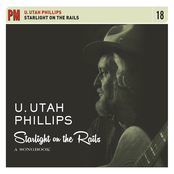Starlight on the Rails: A Songbook

Biography
Bruce "Utah" Phillips (b. May 15, 1935 in Cleveland, Ohio; d. May 23, 2008 in Nevada City, Calif.) was a labor organizer, folk singer, songwriter, storyteller, poet and self-described "Golden Voice of the Great Southwest". He described the struggles of working people, labor unions and the power of direct action. He often promoted the Industrial Workers of the World in his music, actions, and words. His original songs include the often-covered "Green Rolling Hills of West Virginia" and "Rock sal...
Bruce "Utah" Phillips (b. May 15, 1935 in Cleveland, Ohio; d. May 23, 2008 in Nevada City, Calif.) was a labor organizer, folk singer, songwriter, storyteller, poet and self-described "Golden Voice of the Great Southwest". He described the struggles of working people, labor unions and the power of direct action. He often promoted the Industrial Workers of the World in his music, actions, and words. His original songs include the often-covered "Green Rolling Hills of West Virginia" and "Rock salt and nails."
His official website is http://www.utahphillips.org/, and his blog is http://utahphillips.blogspot.com/
An obituary from Sing Out! magazine can be read at http://singout.wordpress.com/2008/05/24/bruce-utah-phillips-passes/
Utah Phillips' given name was Bruce Phillips. A fan of T. Texas Tyler, Phillips adopted the stage name U. Utah Phillips.
Phillips served the United States Army for three years beginning in 1956. Witnessing the devastating effects of the post Korean War Korea greatly influenced his social and political thinking. Following service, he returned to Salt Lake City, Utah, and joined Ammon Hennacy from the Catholic Worker Movement in establishing a mission house of hospitality named after the activist Joe Hill. Phillips worked at the Joe Hill House for the next eight years, then ran for the U.S. Senate as a candidate of Utah's Peace and Freedom Party in 1968.
He met folk singer Rosalie Sorrells in the early 1950's, and has remained a close friend of hers ever since. It was Sorrells who started playing the songs that Phillips wrote, and through her his music began to spread. After leaving Utah in the late 60's, he came to Saratoga Springs, NY, where he was befriended by the folk community at the Caffe Lena coffee house, where he became a staple performer throughout that decade.
An avid railway fan, Phillips recorded several albums of music related to the railroads, especially the era of steam locomotives. His first album, Good Though!, is an example, and contains such songs as "Daddy, What's a Train?" and "Queen of the Rails" as well as what may be his most famous composition, "Moose Turd Pie" wherein he tells a tall tale of his work as a gandy dancer repairing track in the American southwest desert.
Phillips became an elder statesman for the folk music community, and a keeper of stories and songs that might otherwise have passed into obscurity. He was also a member of the great Traveling Nation, the community of hobos and railroad bums that populates the midwest United States along the rail lines, and was an important keeper of their history and culture.
Until it lost its funding, Phillips hosted his own weekly radio show, Loafer's Glory: The Hobo Jungle of the Mind. Read more on Last.fm. User-contributed text is available under the Creative Commons By-SA License; additional terms may apply.
